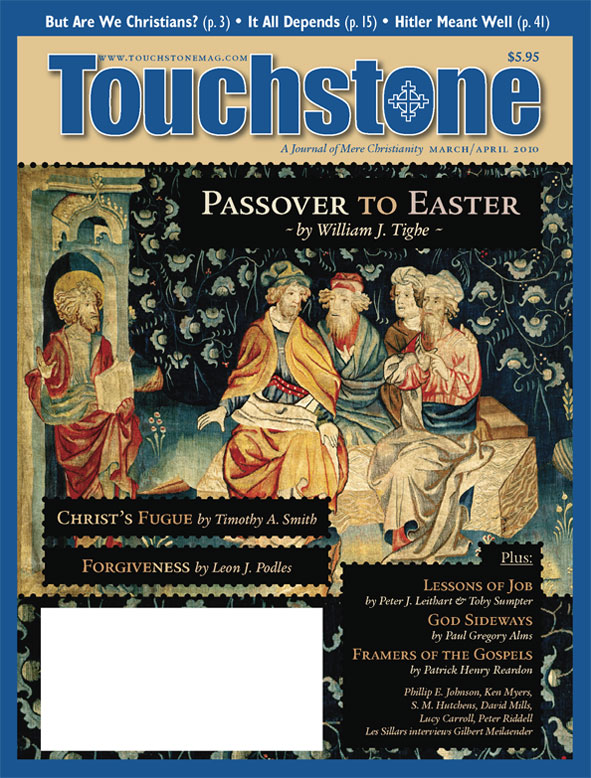It All Depends
Philip Rempel on Randomness & the Providence of God
During my undergraduate days, I started hearing, in the Christian group in which I was involved, the use of the word “random” as an appreciative slang adjective, functioning as a sort of subcategory of “cool.” Meeting a friend unexpectedly, or declaring an unusual hobby or an odd taste in music, might draw an approving, “That’s so random!” I think the phrase was meant, at least semi-consciously, as a joyful response to the wonderful variety and unexpectedness of the world God has made. However, it seems to me that, far from being a Christian response to creation, it is at heart profoundly unchristian, and is evidence of a widespread and unthinking capitulation to the language of secular postmodernism.
All stories involving postmodernism seem to start in the “once upon a time” of the Modern world—and this one is no different. The deficiencies of the Enlightenment worldview are more apparent to us than those of postmodernism because the Enlightenment is further removed from us; and since the postmodern era owes so much to the modern, it is almost always necessary to see the two periods together.
From Clockwork to Chaos
The Enlightenment posited, through its scientific models and its philosophies, a universe of general order and mechanicity. It viewed the world as rigid, and ultimately (though perhaps not practically) predictable. This view naturally suited a period in which science and technology advanced rapidly, but its focus on mechanisms and mathematical models was also a weakness.
A calibrated clockwork cosmos proved extremely useful for discussing Newtonian physics, but it held no mystery, no poetic power, to captivate men’s hearts. The Enlightenment could never be completely convincing to those who were told that all of creation was essentially a lifeless automaton, but who, on stepping outside, found it very much alive.
The twentieth century brought with it Schroedinger and uncertainty theory, and the old theories were updated or replaced with new ones in which ultimate predictability was no longer guaranteed, and often no longer possible. It seems that the world was not best described as a large clockwork.
So the old models were thrown out, and from then until now Western man has been trying to come to terms with a universe whose structure has been removed—and he has done so in an unfortunate way. He has rejected the external governing order and replaced it with internal foundational chaos. The Law has been replaced by the Whim. Whereas in the eighteenth century the universe could be seen as a Machine, it now appears to be a Machine on the fritz.
God Eliminated
And still the new, improved universe lacks plausibility; there is still a discrepancy between what the accepted theory states that the world is like and what we see if we open our eyes and look around. And this is because the new random world is just as dead and dreary as the old mechanical world. It is simply less mechanical.
In discarding modernism, postmoderns missed the fundamental reason the Enlightenment worldview was inadequate. The Enlightenment had reduced the world to a mathematical system, and had, for convenience’s sake, included God in that model and reduced him, too. Or rather, because scientists and philosophers couldn’t figure out how to reduce him, they eliminated him by sending him off into space.
Share this article with non-subscribers:
https://www.touchstonemag.com/archives/article.php?id=23-02-015-v&readcode=2713
subscription options
Order
Print/Online Subscription

Get six issues (one year) of Touchstone PLUS full online access including pdf downloads for only $39.95. That's only $3.34 per month!
Order
Online Only
Subscription

Get a one-year full-access subscription to the Touchstone online archives for only $19.95. That's only $1.66 per month!
bulk subscriptions
Order Touchstone subscriptions in bulk and save $10 per sub! Each subscription includes 6 issues of Touchstone plus full online access to touchstonemag.com—including archives, videos, and pdf downloads of recent issues for only $29.95 each! Great for churches or study groups.
Transactions will be processed on a secure server.
more from the online archives
calling all readers
Please Donate
"There are magazines worth reading but few worth saving . . . Touchstone is just such a magazine."
—Alice von Hildebrand
"Here we do not concede one square millimeter of territory to falsehood, folly, contemporary sentimentality, or fashion. We speak the truth, and let God be our judge. . . . Touchstone is the one committedly Christian conservative journal."
—Anthony Esolen, Touchstone senior editor









